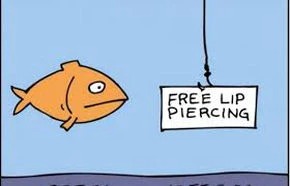(I couldn’t find the comic credit…so whomever did it, thank you!
How do you feel when you’re buying something online – and the site has everything positioned as perfect with no reviews?
How about a site that has reviews, but every single one is a perfect 5.0? Do you think to yourself, “Wow, this product must be perfect”?
Do you go do your own homework?
Do you leave the site, and never come back?
With that in mind, are you writing proposals that act the same way – presenting everything as perfect?
We, as buyers, are wired to try to predict what our experience is going to be using the products or services we’re investigating. It’s why reviews, and specifically, negative reviews help. Whereas, according to PowerReviews data:
- 96% of us read reviews before making a new purchase of medium-to-high consideration online
- 82% of us seek out the negative reviews first, and,
- A product with an average review score between a 4.2-4.5 sells better than a 5.0.
Doesn’t matter if it’s a website acting as the seller, or a human being. Transparency sells better than perfection.
No product or service is perfect. Our buying brain won’t settle until it analyzes the pros AND THE CONS. It’s why negative reviews listed right next to a product online aid the buyer. It’s also why, in human-to-human selling, 62% of the buyer’s time (according to Gartner) is spent researching outside of the claims of you or your competitors – because they aren’t getting anything less than “perfect-speak” from you. When we present our products or services as less than perfect (aka, a 4.2-4.5 range, or as Tyra Banks would call it, “flawsome”), sales cycles speed up, win rates rise, deals are better qualified in or out faster, and we make it really hard on our competitors to compete with us.
When I read advice about writing proposals, why do I never see a suggestion of aiding the buyer through outlining the risk? Through outlining what could go wrong? Through describing what are you sacrificing as an organization to be really good at your core focus? IKEA sacrifices the buying and assembly experience so you can have modern furniture that you didn’t pay much for. Southwest Airlines sacrifices some of the perks so they can provide less expensive travel opportunities. How about you?
If you suck at something that’s really important to a buyer:
- Wouldn’t it better to tell them that now, versus after you’ve invested weeks or months into a sales cycle? Better to lose fast than to lose slow…
- With the proliferation of reviews and feedback on everything we do, buy and experience, they’re likely gonna find out anyway…and,
- Leading with those flaws is an incredible way to accelerate trust.
A proposal is there to aid the buyer on their journey – to serve as a resource to reference, socialize and aid in building internal consensus. Give those buying brains what they need! Maintain control of the buying journey by including the cons of your product or services in your proposals, so they don’t have to do more homework!
Yes…I’m serious. Try it. I bet it works 😊






0 Comments